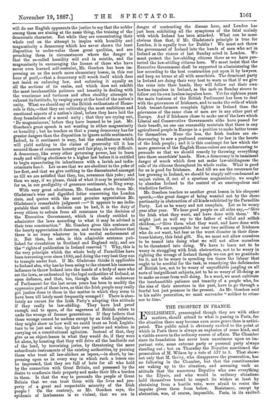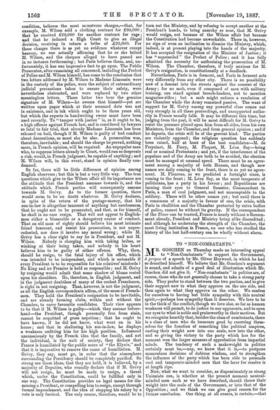THE PROSPECT IN FRANCE.
ENGLISHMEN, preoccupied though they are with other matters, should attend to what is passing in Paris, for the situation there may become even more grave than is antici-• pated. The public mind is obviously excited to the point at which in Paris there is always an explosion of some kind, and a visible swerve in the ordinary course of affairs. The Chamber since its foundation has never been unanimous upon an im- portant vote, some extreme party or personal party always standing out ; but on Thursday the Deputies sanctioned the prosecution of M. Wilson by a vote of 527 to 3. That shows not only that 31. Grdvy, who disapproves the prosecution, has no following in the Chamber, but that the constituencies are waking up to the situation, and assuming such an attitude that the numerous Deputies who owe everything to the Elysde, and who would in ordinary situations hold themselves bound to respect its wishes at least by abstaining from a hostile vote, were afraid to resist the impulse given them from below. Resistance, except by abstention, was, of course, impossible. Paris, in its excited,
condition, believes the most monstrous charges,—that, for example, M. Wilson sold a clothing contract for £80,000 ; that he received £20,000 for another contract for rugs ; and that he induced a High Court to give an illegal decision, receiving in return a bribe of £20,000. For these charges there is as yet no evidence whatever except hearsay, no one actually affirming that he or she bribed M. Wilson, and the cheques alleged to have passed are ia no instance forthcoming ; but Paris believes them, and, un- fortunately, it has one impressive fact to go upon. The Public Prosecutor, after examining all concerned, including the Prefect of Police and M. Wilson himself, has come to the conclusion that two letters addressed by M. Wilson to Madame Limousin were in the custody of the police, were the subject of extraordinary judicial precautions taken to ensure their safety, were nevertheless abstracted, and were replaced by two other meaningless letters. These latter two bear the genuine signature of M. Wilson—he swears that himself—yet are written upon paper which at their assumed date was not in existence, and in ink which ought to be three years old, but which the experts in handwriting swear must have been used recently. To "tamper with justice" is, as it ought to be, a high offence against French law, and is considered by lawyers so fatal to fair trial, that already Madame Limousin has been released on bail, though if M. Wilson is guilty of bad conduct about decorations, so must she be also. A prosecution was, therefore, inevitable ; and should the charge be proved, nothing more, in French opinion, will be required. An unpopular man who, to suppress letters already in Court, would run so desperate a risk, would, in French judgment, be capable of anything ; and M. Wilson will, in this event, stand in opinion finally con- demned.
So far, there will be little difference of opinion among English observers ; but this is but a very little way. The true questions which give to the Wilson affair all its importance are the attitude that the President assumes towards it, and the attitude which French parties will consequently assume towards M. Gravy. As to the former question there would seem to be no doubt whatever. M. Gravy declares, in spite of the return of the postage-money, that his son-in-law is altogether innocent of anything but carelessness, that he ought not to be prosecuted, and that, as for himself, he shall in no case resign. That will not appear to English- men either a blameable or a derogatory course of conduct. That an old man of eighty should believe his most intimate friend innocent, and resent his prosecution, is not unpre- cedented, nor does it involve any moral wrong ; while M. Gravy has a clear right to say he is President, and not M. Wilson. Nobody is charging him with taking bribes, or winking at their being taken, and nobody in his heart believes him to be guilty of either offence. Why, then, should he resign, to the fatal injury of his office, which was intended to be independent, and which is untenable if every President is to be responsible for his relatives' misdeeds No King and no Premier is held so responsible ; and M. Gravy by resigning would admit that some shadow of blame rested upon his shoulders. He, therefore, in English judgment, and in the judgment doubtless of many of the coolest Frenchmen, is right in not resigning. That, however, is not the judgment, as all the English correspondents affirm, of the mass of French- men. They hold the President's resignation to be inevitable, and are already forming clubs, within and without the Chamber, to carry favourite candidates. Their view appears to be that if M. Wilson is guilty—which they assume before- hand—the President, though personally free from stain, cannot be acquitted of gross nepotism ; that he ought to have known, if he did not know, what went on in his house • and that in sheltering his son-in-law, he displays a weakness unfitting him for hie high position. Influenced unconsciously by the French idea that the family, and not the individual, is the unit of society, they declare that France is humiliated by the public scorn of " the Elysee," and that it is imperative to remove the cause of humiliation. M. Gravy, they say, must go, in order that the atmosphere surrounding the Presidency should be completely purified. So strong are these ideas, that they are held, it is believed, by a majority of Deputies, who roundly declare that if M. Chevy will not resign, he most be made to resign, a threat which, under the Constitution, could be fulfilled only in one way. The Constitution provides no legal means for dis- missing a President, or compelling him to resign, except through formal impeachment, and the idea of stopping his salary by a vote is only farcical. The only course, therefore, would be to turn out the Ministry, and by refusing to accept another at the President's hands, to bring anarchy so near, that M. Gravy would resign, not because of the Wilson affair but because the Constitution had become unworkable. There is, however, no sign of MD an inclination to dismiss the Ministry, which, indeed, is at present playing into the hands of the majority. It has accepted the resignation of the Minister of Justice ; it has " superseded " the Prefect of Police ; and it has fully admitted the necessity for authorising the prosecution of M. Wilson. The Chamber, therefore, if truly anxious for M. Grevy's resignation, is constitutionally at a deadlock.
Nevertheless, Paris is in ferment, and Paris in ferment acts very differently from any other city. There is no possibility now of a descent into the streets against the consent of the Army ; for no mob, even if composed of men with military training, can stand against breech-loaders, not to mention magazine-rifles • but a mob might enforce a resolution of the Chamber while the Army remained passive, The want of support for M. Gravy among any powerful class comes out very strongly in all these proceedings, and unsupported autho- rity in France usually falls. It may be different this time, but judging from the past, it will be most difficult for M. Gravy to resist the pressure placed upon him from all sides, from his own Ministers, from the Chamber, and from general opinion ; and if he departs, the crisis will be of the gravest kind. The parties are violently opposed ; the religious question has suddenly been raised, half at least of the beat candidates—M. de Freycinet, M. Ferry, M. Floquet, M. Leon Say—being real or nominal Protestants ; and yet, if the interference of the populace and of the Army are both to be avoided, the election must be managed at unusual speed. There must be an agree- ment among a majority of both Houses, and though new names are daily coming to the front, there is as yet no agree- ment. M. Flourens, as we predicted a fortnight since, is coming to the front ; M. Leon Say, as the most temperate of politicians, has a party in his favour ; and Republicans are turning their eyes to General Sanssier, Commandant in Paris, a man of cool judgment, and not unacceptable to the soldiery. There will be other names yet ; but until there is a consensus of a majority in favour of one, the crisis, with Paris in ebullition and the Chamber protected by extra bodies of police, cannot be without its gravity. If the correspondent of the Times can be trusted, France is nearly without a Govern- ment already, President and Ministry being alike discredited; and although he underratqs the strength of the Chamber, the most living institution in France, no one who has studied the history of the last half-century can be wholly without alarm.
























































 Previous page
Previous page